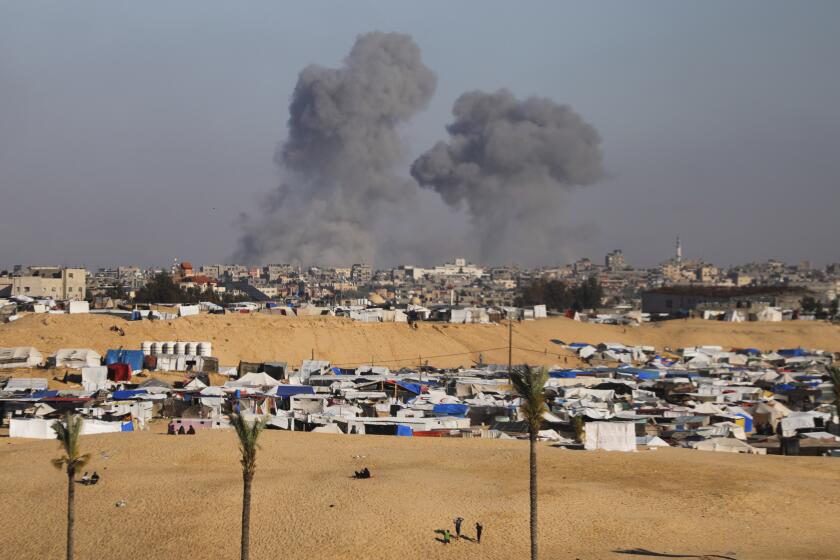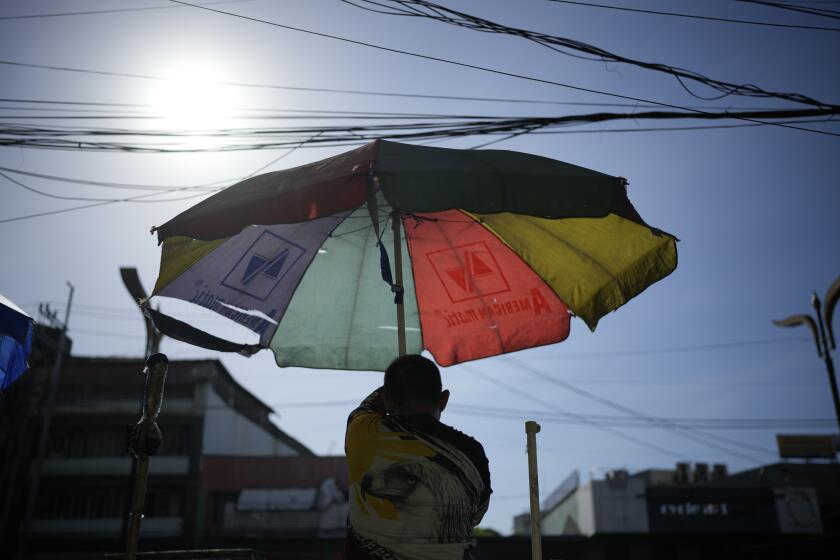Kandahar Enjoying Relative Calm
The warlord apologizes for the state of his palace. “The problem is Taliban looting,” he says. “In this house, we could not find a single carpet to sit on. I think you can see this one is a new one. We just purchased it yesterday.”
This is the new governor of Kandahar, a city that a week ago was the besieged stronghold of the Taliban. On Tuesday, the Taliban was gone, a new government was in place, and the city’s former governor--former moujahedeen commander Gul Agha Shirzai--was holding court at the governor’s palace with hundreds of turbaned tribal leaders and warriors.
“Our existing moujahed groups are forming part of the police force immediately,” said Shirzai, whose forces swept through southern Afghanistan in the wake of the American bombing campaign and control nearly everything from Kandahar to the border with Pakistan. “We want the law to be established. Law and order cannot come with so many guns around, even if they’re friendly.”
As a new interim government prepares to take its place in the Afghan capital, Kabul, next week, the most troubling threat to stability in this country, which has been plagued by 23 years of conflict, is the resumption of tribal warfare. Warlords such as Shirzai are returning from comfortable retirement, and tribal commanders are setting up checkpoints on competing street corners--the kind of chaos that caused a weary populace to welcome the Taliban in 1996.
This city, which was bombed more heavily than any other in the U.S. air campaign and was the last to be deserted by the senior Taliban leadership, seems to enjoy relative calm thanks to a last-minute truce that ended several days of sporadic fighting and restored Shirzai to his pre-Taliban post as governor.
Governor Meets With Foreign Reporters
Military control of the province fell to a powerful mullah with troops of his own, Naquibullah.
On Tuesday, the day the Pakistani border opened to allow a flood of journalists into the city, Kandahar was under a nighttime curfew and was patrolled by heavily armed young men loyal to Shirzai.
The 60 miles of rutted dirt road from the Pakistani border were strewn with burned-out Taliban tanks and the twisted frames of trucks, buses and cars demolished in the American bombing campaign. But there was only one checkpoint. Two days earlier, there had been at least 16 set up by three feuding tribes.
However, two tribes bitterly contesting control of the strategic border town of Spin Buldak had guns mounted ominously on shop roofs in the bazaar.
Weeks of fighting for Kandahar airport apparently ended with the triumph of Shirzai’s forces over about 300 Al Qaeda fighters who had been holed up in a former terminal building since the Taliban’s surrender last week.
“The airport is totally clean now, since yesterday morning,” said Shirzai, a burly, gravel-voiced man of huge proportions--the Hollywood stereotype of an Afghan warlord.
He said his forces also captured more than 250 Taliban fighters in the battle for Kandahar, all but two of them Afghans. “After disarming them, we release them, then send them home with some money in their pockets,” he said.
About 1,800 prisoners who had been held by the Taliban were released from the city jail.
Shirzai has appointed a police chief and pledged to have a rudimentary police force in place in 24 to 48 hours. Then, he said, he will begin collecting weapons from the population, put a civil administration in place and start setting up government service programs.
Kandahar, where Taliban leader Mullah Mohammed Omar not long ago vowed to die fighting for the most radical Islamic government in the world, is a city on its way back to stability.
Shirzai was meeting not only with his fellow tribesmen but with a convoy of foreign reporters whom the warlord had brought from the Pakistani border with the help of a dozen gunmen.
The journalists arrived at the governor’s mansion Tuesday evening to see hundreds of turbaned fighters and elders milling around. They overflowed the palace’s broad portico and encamped on its lawn. Many of them carried Kalashnikov assault rifles.
They parted to admit the visitors to the main hall, reaching out to shake hands and smiling shyly as they extended greetings of peace.
Fighter Says Taliban Threat Has Vanished
Although many of these men fought with the Taliban and had a fearsome outward appearance, those who were asked said that they support the moderate policies of the newly appointed head of Afghanistan’s temporary administration, Pushtun politician Hamid Karzai.
A fighter who gave his name only as Janan said that the soldiers were living on the grounds of the governor’s palace or in the immediate vicinity. He agreed with Shirzai’s assessment that the Taliban threat had totally vanished, although he said that there had been fighting around the airport, which is located about 12 miles outside Kandahar.
“There may be some Arabs still there. We don’t have an exact figure,” he said. “They hide in houses and trenches in that area.”
Janan said that American troops had visited the airport area and had also combed through Omar’s compound, which Karzai has made his temporary headquarters in Kandahar. (Karzai was due to leave the southern city today to fly to Kabul for the first time since his appointment.)
Another fighter, Attaullah, 24, said a mood of calm had quickly settled on the city.
“We think it will be peaceful and stability will come to our country because the government selected represents all groups,” he said. He said that there was not much hostility toward America because of the bombing campaign but added: “When peace and stability come, the Americans should leave Afghanistan. They should not stay here.”
Attaullah acknowledged that he had never fought for Karzai or Shirzai but said that he would be willing to in the future. “Whoever wants to bring peace and stability, we are for them.”
On a drive through the town Tuesday night, the effects of the recent U.S. bombing were not very obvious. Instead, there were many signs of a quick return to normality.
A guard pointed out a square that had been bombed because it was the site of a Taliban headquarters building, but all the other buildings in the vicinity appeared unscathed.
A few shops were open, brightly lighted and selling soft drinks, candy and cheap packaged foods brought in from Pakistan. There were fruit and vegetable stands with neat piles of apples, bananas, eggplants and carrots.
In one sign of change, recorded music, which had been outlawed by the Taliban, was playing loudly from a hotel near the center of Kandahar, and across the street some men were even dancing to the beat.
But for a city of its size, the streets were largely empty. Soldiers with little to do warmed themselves by campfires at the occasional checkpoint.
There also seemed to be much confusion. At one checkpoint near Omar’s compound, a reporter was not permitted to proceed unless his interpreter could recite the day’s password.
That required a tedious trip back to the provincial governor’s palace to get the secret code word from a government official. But when the journalist and the translator returned and gave the password, the soldiers looked puzzled. It wasn’t the word they had been given.
More to Read
Start your day right
Sign up for Essential California for news, features and recommendations from the L.A. Times and beyond in your inbox six days a week.
You may occasionally receive promotional content from the Los Angeles Times.






